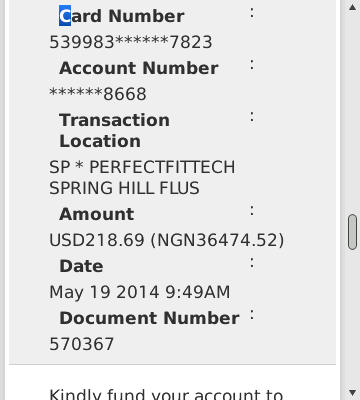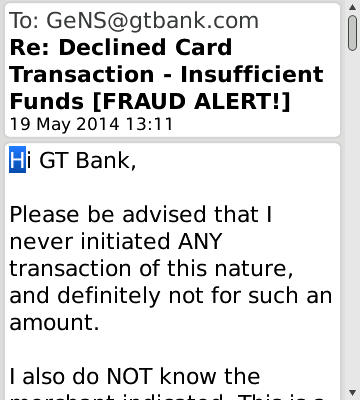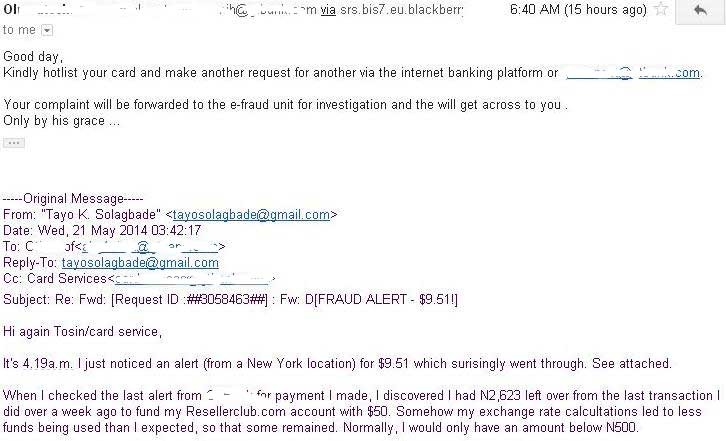This article was first published on this blog 3 months ago, on Friday 23rd May 2014 (see browser history screenshot below). Today, when I tried linking to it, to post a comment on Facebook, I got a “Page Not Found” error on my blog. A MySQL database check soon revealed it was GONE: “Yepa!”!
But I suspect no foul play. It’s quite likely it “got lost” during the back and forth cross-database updates from my old to new hosts following the loss of Spontaneousdevelopment.com (my former, 9 year old domain name).
Whatever the case, here’s the FULL article republished.
But just before you read it, here’s my comment on recent newspaper reports on this theme, which made me want to link THIS article from Facebook in the first place:
Punch Newspaper Headline (27th Aug. 2014): Fraudsters shop abroad with cloned Nigerian ATM cards
This is not the first such headline I have seen. When I saw one for the first time few days after arriving Lagos, from Cotonou (2 weeks ago), I found report headlines like the above hard to comprehend.
But now it’s all starting to make sense.
For fraudsters to successfully clone ATM cards, they will need insider help. And my recent personal experience equips me to piece together key parts of the puzzle…
This is why despite picking up my new ATM/debit card on arriving Nigeria about 2 weeks ago, I’ve been VERY reluctant to put it to use for my international web hosting and other payments online.
You see, just few months ago, the previous (now expired) card from the same bank, which I’d actively used without issues for 3+ years mysteriously got hacked and an attempt was made to use it for shopping by one “Rabbi” in “New York”.
Luckily, the card was not directly linked to an account that had enough funds to cover the transaction. That was a due diligence precaution I’d proactively taken earlier in the year.
But these guys were persistent (and wretched!) as they kept reducing the amount charged to the card, till they took out the less than $13 USD balance left over in the linked account from the last domain name registration and web hosting payments I’d funded it for.
I never understood how my card got compromised, and my bank also had no answer. So I waited for my card to expire – and it did on 31st July 2014. Since then, I’ve been too wary to start using the new one!
Then I came back here (Lagos) and began reading newspaper reports claiming some bank staff have been implicated in using customer cards online…and I told myself: EUREKA!
See article I wrote to warn/alert others to the potential danger:
===Now go on and read below===
Protect Your Debit Card from Online Fraudsters…or This Could Happen to You (True Story)
If you use a debit/credit cards, you may want to read about this experience I had within the last 24 hours. Why? Because doing so could just help you avoid leaving yourself open to having someone drain out your bank account!
I spent yesterday morning corresponding via phone and email with my bank in Nigeria…
It had to do with 3 International Transactions on my debit mastercard by fraudsters.
They began by applying a charge of $218 fee to my GTB MasterCard.
Since I use a Blackberry, I saw the alert announcing “Transaction Declined due to Insufficient funding” as soon as it came in.
Luckily for me, the account linked to the card (which is the one I also use to make payment for hosting renewal etc) is one that I keep almost at NIL balance.
I chose to do this based on past experience when I inadvertently let my Skype subscription autorenew when I did not need it.
Otherwise, that attempt would have gone through – and these crooks would have gotten away with it.
A bank account officer called me yesterday evening to discuss what steps I could take, after I emailed a complaint to them,
We agreed that I would continue what I’d doing, by keeping funds NIL until I need to use it, then once loaded I make payment to return it to NIL status.
That way, the fraudster would stand no chance of getting funds out if they try again.
As explained above the first attempt (for $218 USD) did not got through.
What I did not know was that my last transaction had resulted in about N1,500 being left as balance!
After discussing with the account officer who called me from Nigeria yesterday, the crafty guys charged $9.51 and then $5 USD overnight (between 2 a.m and 5a.m) successfully!
You see, I did not know my last online payment had left a balance that much, otherwise I woudl have spent it.
Normally I try hard to use up any balance to the barest minimum by loading funds to a reseller account I run for my web hosting service. But my exchange rate calculation for $50 USD equivalent was off, and I ended up leaving some funds behind, that the guys took out.
They must have kept lowering the applied charge all night or soemthing, until it went through.
Each alert I got, I sent an email to the bank, requesting that they do a reversal.
My account manager replied my email this morning saying I should authorize the bank to block the card.
The problem is that I have 2 web hosting clients I need to do renewals for in July.
A new debit card may not be ready for me to use before then.
So after thinking about it, I’ve decided I’ll pursue one of 2 options:
a. Continue with my strategy of keeping my balance close to NIL, until I need to make payment, then fund it and use up at once.
b. From discussions I had with a banker friend, I can purchase a virtual Mastercard I can make use of on a one-off basis.
The second option appeals to me more.
Interestingly, I used to do that about 8 years ago. And it was always a much safer way to spend online. I guess I should thank the fraudsters for pushing me to THINK of a better way!
In case you wonder, I still have no idea how they got my card details.
I’ve always tried to be very careful these past 4 years of using it.
I’m not sure if this was done by Nigerian fraudsters or not. But the location on the transaction notices has been in the USA.
Lesson you can take away: Beware of linking your debit card to an account that has a FAT balance!
It would be better to be safe than sorry. I never imagined this could happen to me, and it has. Plus, I found out nothing could really be done short of disabling my card. In other words, even your Nigerian bank cannot help you.
Compare the case of my brother in law who lives in the UK. He simply told his credit card company to back charge or reverse the charge when it recently happened to him.
But that did not mean he would not be able to use his card anymore. Or that he would have to pay to get a new one!
Which is what my bank in Nigeria has told me. Not very helpful is it…!
So, if you’re in Nigeria, or using a Nigerian bank’s card for online payments, it would be safter to AVOID this kind of problem altogether, by not letting it happen in the first place.
Onee again the message is: Beware of linking your debit card to an account that has a FAT balance!
Please pass this on!





